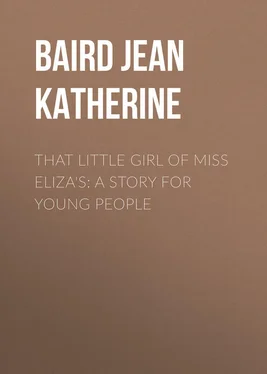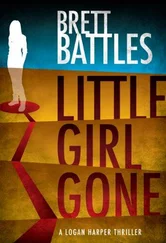Jean Baird - That Little Girl of Miss Eliza's - A Story for Young People
Здесь есть возможность читать онлайн «Jean Baird - That Little Girl of Miss Eliza's - A Story for Young People» — ознакомительный отрывок электронной книги совершенно бесплатно, а после прочтения отрывка купить полную версию. В некоторых случаях можно слушать аудио, скачать через торрент в формате fb2 и присутствует краткое содержание. ISBN: , Издательство: Иностранный паблик, Жанр: foreign_antique, foreign_prose, foreign_children, на английском языке. Описание произведения, (предисловие) а так же отзывы посетителей доступны на портале библиотеки ЛибКат.
- Название:That Little Girl of Miss Eliza's: A Story for Young People
- Автор:
- Издательство:Иностранный паблик
- Жанр:
- Год:неизвестен
- ISBN:http://www.gutenberg.org/ebooks/35822
- Рейтинг книги:5 / 5. Голосов: 1
-
Избранное:Добавить в избранное
- Отзывы:
-
Ваша оценка:
- 100
- 1
- 2
- 3
- 4
- 5
That Little Girl of Miss Eliza's: A Story for Young People: краткое содержание, описание и аннотация
Предлагаем к чтению аннотацию, описание, краткое содержание или предисловие (зависит от того, что написал сам автор книги «That Little Girl of Miss Eliza's: A Story for Young People»). Если вы не нашли необходимую информацию о книге — напишите в комментариях, мы постараемся отыскать её.
That Little Girl of Miss Eliza's: A Story for Young People — читать онлайн ознакомительный отрывок
Ниже представлен текст книги, разбитый по страницам. Система сохранения места последней прочитанной страницы, позволяет с удобством читать онлайн бесплатно книгу «That Little Girl of Miss Eliza's: A Story for Young People», без необходимости каждый раз заново искать на чём Вы остановились. Поставьте закладку, и сможете в любой момент перейти на страницу, на которой закончили чтение.
Интервал:
Закладка:
That Little Girl of Miss Eliza's: A Story for Young People
CHAPTER I
“The poorest farming land in all the country,” someone called it. “The best crop of stones and stumps, I ever saw,” someone else had said. Everyone smiled and drove on, and Shintown and its people passed from their knowledge.
“Shintown? Where in the name of goodness did they get such a name?” the elderly gentleman in the touring car asked his companion.
“Have to use your shins to get here. It used to be that Shank’s mare was the only one that could travel the miserable roads. They were mere foot-paths. Even the railroads have shot clear of it. See over there.”
There was truth in the words. Shintown, which was no town at all, but a few isolated farmhouses, looked down from its heights on one side upon the main line of the Susquehanna Valley, five miles away. On the other side, at a little more than half the distance, the branch of the W. N. P. and P. wound along the edge of the river. Both roads avoided Shintown as though it had the plague. The name was quite enough to discourage anyone. Nature had done its best for the place, the people had done their worst. It stood in the valley, and yet on a higher elevation than the country adjacent, the mountain being twenty miles distant. It was as though a broad table had been set in a wide country, with the mountain peaks as decorous waiters standing at the outer edge.
The houses were sagging affairs. They were well enough at one time, but were now like a good intention gone wrong. The storm had beaten upon them for so many years that all trace of paint was gone. The chimneys sloped as far as the law of gravity allowed. Gates hung on one hinge, and the fences had the same angle as an old man suffering with lumbago.
The corners of the fields were weed-ridden. The farmers never had time to plow clear to the corners and turn plumb. The soil had as many stones as it had had twenty years before. The whole countryside was suffering from lack of ambition. Crops were small, and food and clothes were meager. The stock showed the same attributes. It was stunted, dwarfed, far from its natural efficiency in burden bearing, milk-giving or egg-laying.
There was one place not quite like this – the old Wells place at the cross roads. The house was neither so large, nor so rambling as the others. It stood deep among some old purple beeches, and in summer it had yellow roses clambering over one entire side. The color was peculiar, and marked its occupant and owner just a little different from other people in the community. Everyone conceded that point without a question. She was just a little different. The house was all in shades of golden brown; brown that suggested yellow when the sun shone. It was a color that not a man in Shintown or a painter at the Bend or Port would have thought of putting on a house. Who ever thought of painting a house anything but white with green shutters or a good, serviceable drab? Golden browns in several shades! Why, of course, the woman must be peculiar. She did the work herself too. She arose at daylight to paint the upper portion and she quit work when travel on the highway began.
That was another peculiarity which the countryside could not understand; a woman who could be independent enough to choose what color she would, in defiance of all set laws, and yet afraid to let folks see her climbing a ladder to the second story.
If peculiar means being different, Eliza Wells was that. She was thirty, and never blushed at it. She had even been known to mention her birthdays as “I was twenty-nine yesterday. How time does fly!” And she said it after the manner of one who might have said, “To-morrow I set the old Plymouth Rock on a settin’ of Dominick eggs.”
But the country folk were kind enough and overlooked her not being as themselves. There was a knowing smile now and then, a sage nodding of the head. Now and then someone went as far as to say, “That’s Liza’s way. She never did act like other folks.”
Eliza knew she was peculiar and tried her best to be like those about her. She had never known any other kind of people; for she had been born and bred in the little place. But do as she could, her own self would break loose every now and then. In spite of her effort to be like other people, there were times when she could be nothing but her own unusual, individual self.
It was not that she admired the ways of life of the people about her. Had she done so, it might have been easier to have become like them. But she argued in this fashion: if all these hundred souls lived in one way and declared that to be the right way, then surely she was wrong, and her ideas had all gone awry somewhere; for one could not stand against a hundred.
The old Wells place had all the finger-marks of having a peculiar occupant. Hollyhocks all along the walk to the milk-house, nasturtiums climbing over a pile of rock; wistaria clinging to the trunk of a dead tree; wild cucumber vines on a trellis shielding the wood-pile and chip yard. In the recess of the old-fashioned front entrance were old blue bowls filled with nasturtiums.
The old blue delft had been in the family of Eliza’s grandmother Sampson for generations. Everybody knew it; but Eliza paraded them and seemed as proud of them as though they had just been purchased from Griffith’s “five and ten.” But she couldn’t fool the people of Shintown. They knew a thing or two and they were certain that the bowls were over a hundred years old.
On hot days, she ate on her kitchen porch, which she had enclosed with cotton fly-net, and she stuck a bunch of pansies in a teacup and had them beside her plate.
That was quite enough to show that she was peculiar. No one else in the country put flowers on the table. Indeed, no one raised them. What was the use? They weren’t good to eat.
But Eliza’s place was not a farm, else she could not have wasted so much time on worthless things. Two acres was all she owned, and she kept half of that in yard and flowers.
She would have had more room for garden if she would have cut down one or more of her purple beeches, but she would not do that. When Sam Houston suggested it to her, saying in his blunt way, “If you’d plant less of the ‘dern foolishness,’ you’d have more room for cabbages,” she replied, with a merry glint in her eye, “Sometimes, I think cabbages is the worst foolishness of all.”
Sam could make no reply to that. A man couldn’t reason with a woman who had no more sense than that.
Eliza Wells could afford to be a little different from anybody else. In the vernacular of the country, “she was well-fixed.” This meant not that she had millions, or even a hundred thousand, but there was money enough out at interest to bring her in fifteen dollars each month. This, with her garden truck and home, made her independent.
To have money in the bank was a distinguishing mark of rank. Not a soul at Shintown except Eliza could boast so much. Sam Houston was the only one in the countryside who had tales to tell of a father and a grandfather who lived on interest money.
Her financial independence made Eliza’s peculiarities a little more bearable. They were the idiosyncracies of the bloated capitalist.
Eliza drove to the Bend the first of each quarter to draw her interest money. She wore a black silk dress and a little bonnet. How she hated the stiff shininess of black silk. How miserably awkward she felt with the caricature of black lace and purple pansies, which custom called a bonnet, on her head. But she had been reared to believe that black silk was the only proper dress for a woman, no longer young, and the days after twenty years were always placed to the credit of age.
So she wore her black silk, although she saw nothing pretty in it. The women of Shintown envied her the possession of such a mark of gentility and declared that Eliza had a good bit of style for a woman of her age, and after a fashion all their own were proud of her.
Читать дальшеИнтервал:
Закладка:
Похожие книги на «That Little Girl of Miss Eliza's: A Story for Young People»
Представляем Вашему вниманию похожие книги на «That Little Girl of Miss Eliza's: A Story for Young People» списком для выбора. Мы отобрали схожую по названию и смыслу литературу в надежде предоставить читателям больше вариантов отыскать новые, интересные, ещё непрочитанные произведения.
Обсуждение, отзывы о книге «That Little Girl of Miss Eliza's: A Story for Young People» и просто собственные мнения читателей. Оставьте ваши комментарии, напишите, что Вы думаете о произведении, его смысле или главных героях. Укажите что конкретно понравилось, а что нет, и почему Вы так считаете.












